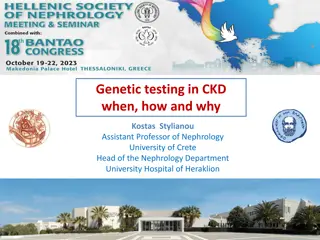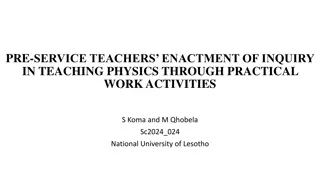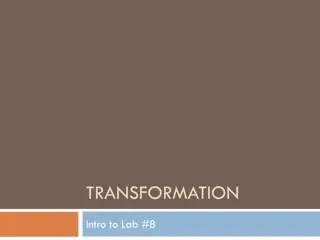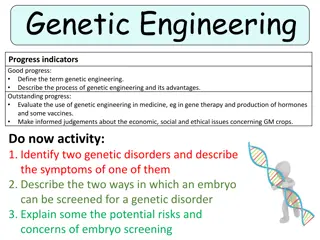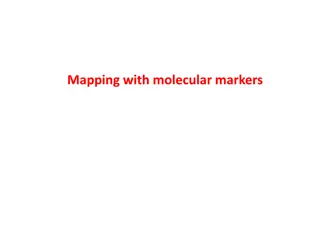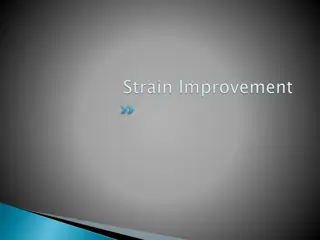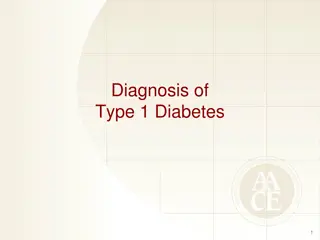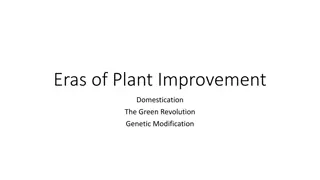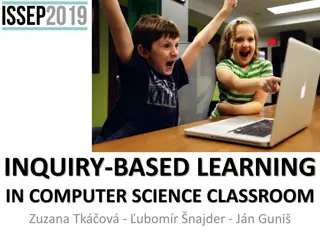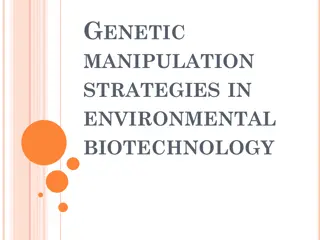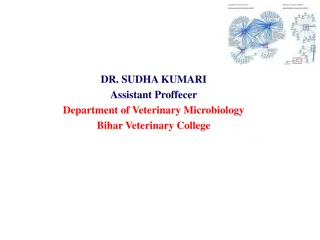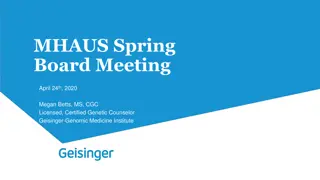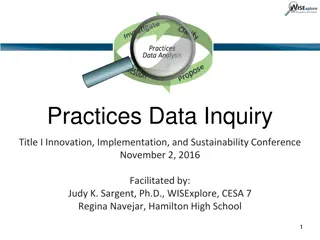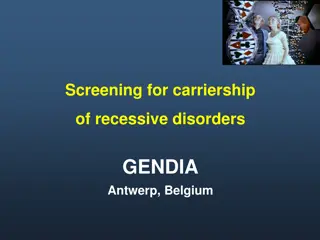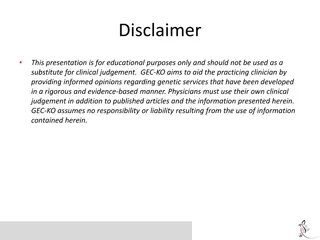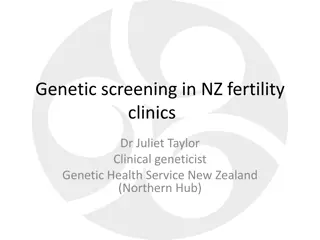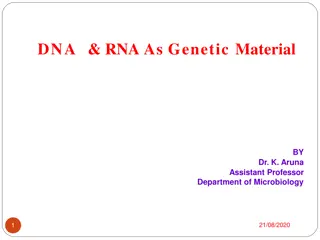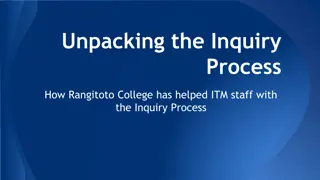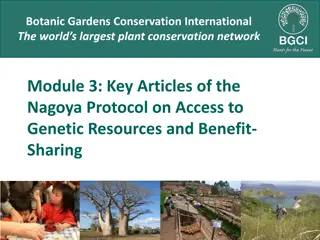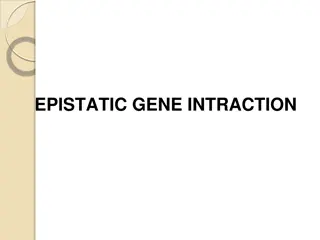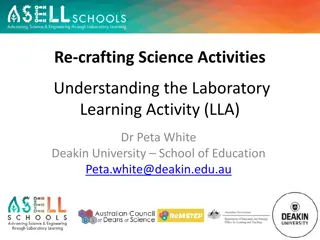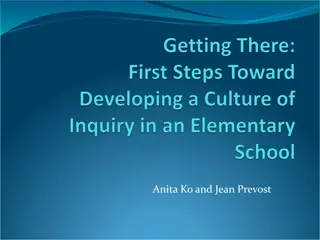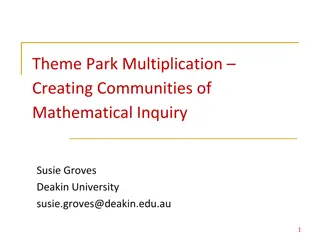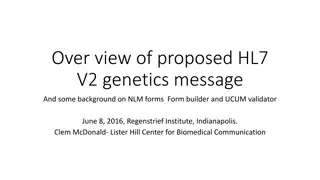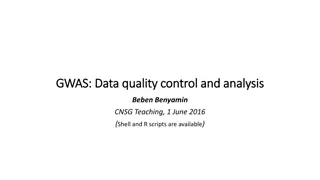Genetic Testing in Chronic Kidney Disease (CKD): Insights and Applications
Genetic testing plays a crucial role in identifying inherited kidney diseases, with around 15% of CKD cases having monogenic causes. Despite a high percentage of patients reporting a family history of CKD, Mendelian causes only account for about 10% of adult ESRD cases. Understanding the genetic bas
1 views • 52 slides
Understanding Pre-Service Teachers' Inquiry Teaching in Physics
Lesotho's curriculum emphasizes hands-on activities and inquiry teaching strategies in Physics. However, challenges such as resource limitations affect practical work involvement. This study explores the levels of inquiry implemented by Physics pre-service teachers (PSTs) during their teaching pract
0 views • 10 slides
Overview of Human Genetic Disorders
Human genetic disorders encompass a range of conditions, from recessive disorders like cystic fibrosis to dominant disorders such as Huntington's disease. Examples include cystic fibrosis, Huntington's disease, and sickle-cell anemia. Understanding genetic disorders involves research and awareness o
0 views • 10 slides
Genetic Transformation: Introduction and Pre-Lab Inquiry
Explore the process of genetic transformation in the laboratory setting, focusing on inserting genes of interest into bacterial cells through recombinant DNA technology. Understand the role of restriction enzymes, plasmids, and genetic markers in this procedure. Engage in a pre-lab inquiry to identi
0 views • 14 slides
Unraveling a Puzzling Blood Disorder: A Genetic Inquiry
A Chicago physician, Dr. James Herrick, encountered a mysterious blood disorder in a West Indies student back in 1904. This condition, characterized by fatigue, joint pain, yellowish eyes, and an affected family history, poses a genetic inheritance puzzle. Investigations into Mendelian inheritance p
0 views • 16 slides
Exploring Genetic Engineering: From Basics to Applications
Genetic engineering involves altering the genetic material of organisms to achieve desirable traits. This process entails cutting out specific genes from one organism and transferring them to another. In medicine, genetic engineering finds applications in gene therapy, hormone production, and vaccin
0 views • 12 slides
Understanding Genetic Markers in Molecular Mapping
Genetic markers play a crucial role in gene mapping within molecular biotechnology. They are fragments of DNA associated with specific genomic locations, aiding in identifying DNA sequences and analyzing genetic variation. Various types of genetic markers such as RFLP, SSR, and SNP offer insights in
1 views • 26 slides
Exploring Skills and Attributes for Personal Inquiry Planning
Discover the skills and learner profile attributes you currently utilize in your personal inquiry process, and reflect on areas for improvement to enhance your planning effectiveness. Engage with insightful image slides depicting key aspects of inquiry planning and self-assessment.
1 views • 9 slides
Exploring My Inquiry Skills through Visual Templates
Dive into a visual journey of self-reflection with images depicting inquiry planning templates. Reflect on your current skill usage, identify areas for improvement, and explore learner profile attributes to enhance your personal inquiry process.
1 views • 9 slides
Understanding Genetics: Mutations, Chromosomal Aberrations, and Genetic Engineering
Genetic mutations can be harmless, harmful, or beneficial, leading to variations within a species. Examples of gene mutations and chromosomal aberrations, like Trisomy 21, illustrate genetic abnormalities. The increase in Down Syndrome cases with maternal age highlights a maternal age effect. Geneti
0 views • 17 slides
Exploring Genetic Engineering: A Journey into Manipulating Organisms
Delve into the world of genetic engineering, where organisms' genetic makeup is altered for various purposes. Discover the process of modification, the history of genetic manipulation, and the impact of genetically modified organisms on society and science.
0 views • 20 slides
Improving Microbial Productivity and Characteristics for Industrial Applications
Efforts to enhance the productivity of natural isolates for commercial products involve genetic modifications through mutation, genetic recombination, and genetic engineering techniques. Desired characteristics include genetic stability, efficient production, versatility in carbon sources, and ease
1 views • 25 slides
Classification and Genetic Defects of Diabetes
The diagnosis and differential diagnosis of Type 1 and Type 2 diabetes are discussed, detailing the clinical courses, age of onset, body weight characteristics, onset patterns, and genetic factors. The etiologic classification of diabetes including insulin-deficient, immune-mediated, monogenic, and
0 views • 16 slides
Understanding the MYP Classroom: A Comprehensive Overview
Explore the key components of an MYP classroom, including the integration of AtL skills, progression through inquiry questions, and alignment of summative tasks with the statement of inquiry. Discover how students engage with concepts, global contexts, and self-assessment, fostering deep inquiry and
0 views • 17 slides
Evolution of Plant Improvement: Domestication to Genetic Modification
Plant improvement has evolved through different eras - from ancient domestication to the Green Revolution and genetic modification. Domestication shaped major crops over millennia, the Green Revolution introduced high-yielding varieties, and genetic modification allows direct genetic alterations for
0 views • 6 slides
**Exploring Inquiry-Based Learning in Computer Science Education**
Inquiry-based learning (IBL) in computer science classrooms focuses on fostering communication, collaboration, decision-making, and problem-solving skills among students. The approach involves students constructing knowledge through independent, active activities based on real-world experiences. How
0 views • 18 slides
Genetic Manipulation in Environmental Biotechnology
Genetic manipulation strategies in environmental biotechnology involve techniques like gene splicing and molecular cloning to modify genes directly. These methods have various applications such as isolating genes, producing specific molecules, improving biochemical production, creating organisms wit
0 views • 20 slides
Understanding Bacterial Transformation in Molecular Biology
Transformation in molecular biology is a process where genetic material is altered by the uptake of exogenous DNA. It involves the direct incorporation of genetic material into a cell, leading to genetic changes. This phenomenon was first demonstrated by Frederick Griffith in 1928. The process of tr
1 views • 25 slides
Understanding Genetic Counselors and the NSGC
Genetic counselors play vital roles in healthcare by assisting patients with genetic conditions, advocating for their needs, educating providers, conducting research, and influencing public policy. The National Society of Genetic Counselors (NSGC) supports genetic counselors in their professional en
3 views • 12 slides
Innovation & Sustainability Conference: Data Inquiry for School Improvement
Explore how student data findings drive inquiry into practices, learn to identify and collect data as practice indicators, understand the Practices Data Inquiry process, and reflect on a Wisconsin school's journey from data analysis to practice analysis.
0 views • 47 slides
Genetic Carrier Screening for Recessive Disorders by GENDIA, Antwerp, Belgium
Explore the world of genetic carrier screening offered by GENDIA in Antwerp, Belgium. Learn about prenatal screening for various genetic disorders, including Down syndrome and severe monogenic disorders. Discover the frequency of common recessive disorders and the severity of genetic diseases. Uncov
0 views • 17 slides
Exploring Expanded Carrier Screening in Family Planning
Learn about expanded carrier screening as a tool for identifying genetic risks in family planning scenarios. Understand the importance of genetic testing, considerations for non-consanguineous couples like Julie and Chris, and the evolving landscape of genetic services. Explore key aspects such as f
1 views • 36 slides
Genetic Screening and Reproductive Carrier Testing in New Zealand Fertility Clinics
Genetic screening and reproductive carrier testing play crucial roles in identifying and managing genetic disorders in couples planning for pregnancy. While carrier screening is recommended for all couples, it is not widely followed in New Zealand. Pre-conceptual reproductive carrier screening is no
0 views • 19 slides
Understanding Direct-to-Consumer Genetic Testing: Cases and Considerations
Explore real-life scenarios of individuals opting for Direct-to-Consumer Genetic Testing (DTC-GT) to assess genetic risk for various health conditions. Consider the implications, limitations, and cautions associated with DTC-GT, highlighting the importance of comprehensive evaluation and genetic cou
0 views • 39 slides
Understanding Genetic Disorders and Their Impact on Health
Genetic disorders are caused by abnormalities in genes or chromosomes, leading to various health conditions. Inherited disorders can be passed down from parents to children, affecting physical makeup and processes in the body. In India, there is a high prevalence of genetic disorders, particularly i
1 views • 12 slides
Understanding DNA and RNA as Genetic Material
Genetic material plays a crucial role in the transmission of traits from one generation to the next. This article explores the significance of DNA and RNA as genetic material, highlighting key experiments and discoveries that demonstrate DNA's role in carrying hereditary information. From Mendel's h
0 views • 32 slides
Understanding Business Inquiry Letters - Types and Examples
Business inquiry letters play a crucial role in establishing communication and gathering information between businesses. This article explores the types of inquiry letters, such as import, domestic, export, and personal, with detailed examples for each type. Learn how to effectively communicate your
0 views • 11 slides
Enhancing Professional Development Through the Inquiry Process at Rangitoto College
Explore how Rangitoto College has supported its ITM staff through innovative practices, mentorship programs, and a culture of inquiry. From unpacking the inquiry process to effective pedagogy, discover the collaborative efforts that promote continuous professional growth and development.
0 views • 35 slides
Understanding the Key Articles of the Nagoya Protocol on Access to Genetic Resources and Benefit-Sharing
The Nagoya Protocol aims to promote fair sharing of benefits from genetic resources utilization for conservation efforts. It encompasses access, technology transfer, funding, and respect for rights over resources and technologies. The protocol applies to genetic resources, traditional knowledge, and
1 views • 19 slides
Independent Inquiry into Child Sexual Abuse (IICSA) Investigations Overview
The Independent Inquiry into Child Sexual Abuse (IICSA) is a statutory inquiry established in March 2015 covering England and Wales, led by Professor Alexis Jay. It has launched 13 investigations into various institutions including cases of child exploitation, institutional responses, and accountabi
0 views • 14 slides
Understanding Epistasis: Genetic Interactions and Their Implications
Epistasis is a phenomenon where the phenotypic expression of one gene is influenced by interactions with another gene. This concept, first introduced in 1909, plays a crucial role in genetics, affecting various traits and evolutionary processes. The difference between dominance and epistasis lies in
0 views • 41 slides
Enhancing Science Education Through Laboratory Learning Activities
Explore the importance of laboratory learning activities (LLAs) in science education, focusing on contemporary science representation, inquiry skills, and conceptual learning. Discover the benefits of inquiry-based learning, teaching science inquiry skills, and incorporating more inquiry-based learn
0 views • 22 slides
Evolutionary Computation and Genetic Algorithms Overview
Explore the world of evolutionary computation and genetic algorithms through a presentation outlining the concepts of genetic algorithms, parallel genetic algorithms, genetic programming, evolution strategies, classifier systems, and evolution programming. Delve into scenarios in the forest where gi
0 views • 51 slides
Understanding the Queensland Parliament's Inquiry on Vilification and Hate Crimes
The Queensland Parliament's Legal Affairs & Safety Committee is leading an inquiry to investigate hate crimes and vilification in Queensland, examining the effectiveness of current laws and encouraging submissions and stories to help address these issues. The inquiry was prompted by the rise in publ
0 views • 27 slides
Developing a Culture of Inquiry in Elementary School: A Journey Overview
Explore the journey of developing a culture of inquiry in an elementary school through three inquiry cycles. Starting with the introduction of Inquiry Based Learning, sustaining interest, learning outcomes, and evolving questions are discussed alongside examples of inquiry learning at various school
0 views • 26 slides
Exploring Mathematical Inquiry in Theme Park Multiplication Communities
Delve into the world of mathematical inquiry through structured problem-solving lessons, careful task selection, and creating a classroom community of inquiry. Witness students' unique solution strategies and engage in discussions on multiplication concepts, all aimed at fostering a deeper understan
0 views • 13 slides
Explore the Inquiry Brief Litmus Test for Effective Action Research
Delve into the Inquiry Brief Litmus Test developed by Nancy Fichtman Dana for robust action research planning. Understand the key components of an inquiry brief and how it guides teams in their exploration of school learning capacity. Utilize the series of questions in the litmus test to refine your
0 views • 30 slides
Understanding the ABC Structure and Pedagogical Approach in Science Education
Explore the ABC structure of inquiry-based learning – from Prescriptive to Open Inquiry, and understand the rationale behind this pedagogical approach in providing authentic disciplinary experiences to students. Overcome challenges in managing unknowns in open inquiry and discover the key elements
0 views • 12 slides
Overview of HL7 V2 Genetics Messaging and LOINC Genetic Testing Codes
This content delves into the proposed HL7 V2 genetics message, NLM forms builder, UCUM validator, and the current state of genetic testing codes in LOINC. It discusses the types of molecular genetic tests present in LOINC and the evolution towards newer genetic tests. The content also covers how LOI
0 views • 21 slides
Understanding GWAS: A Brief Overview of Genetic Association Studies
GWAS, or Genome-Wide Association Studies, are a method used to map genes associated with traits or diseases by analyzing genetic markers throughout the genome. This process involves statistically testing the association between SNPs and traits using regression or chi-squared tests in a hypothesis-fr
0 views • 19 slides
